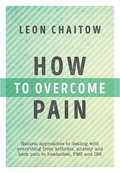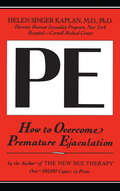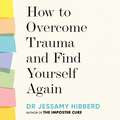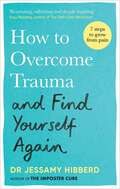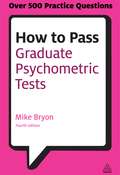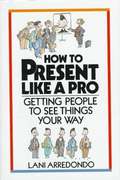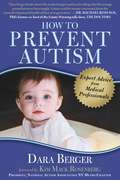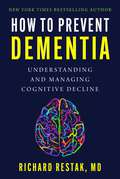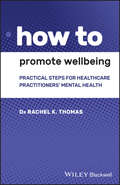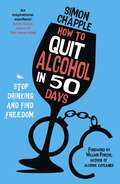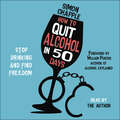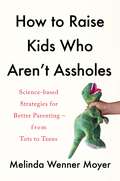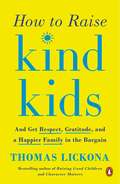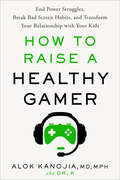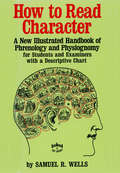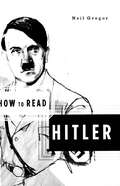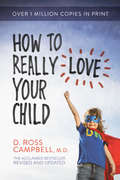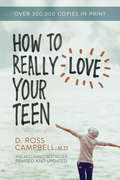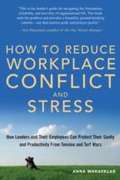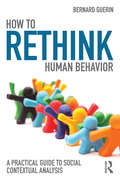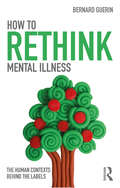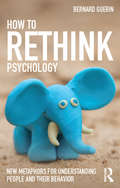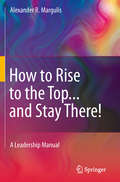- Table View
- List View
How to Overcome Pain: Natural Approaches to Dealing with Everything from Arthritis, Anxiety and Back Pain to Headaches, PMS, and IBS
by Leon ChaitowLiving with pain can provoke frustration, anxiety, depression and sometimes even a reliance on pharmaceutical painkillers. In this important and highly accessible book, registered osteopath and naturopath Leon Chaitow outlines a wide range of tried and tested natural approaches to pain relief, as well as groundbreaking research including the role played by fascia in the experience of pain and a whole host of breakthrough mind-body techniques. The author begins by explaining the nature of pain and why it is that the more you understand about it, the greater an ability you tend to have to overcome it. He then goes on to outline key pain relief approaches including meditation, hypnotherapy, cognitive behavioural therapy, light and colour therapy, breathing techniques, massage, stretching, hydrotherapy and herbalism. There is also extensive information on the importance of nutrition and supplements. And a special feature is the extensive pain directory that provides treatment advice for the most common problems including headaches, neck and shoulder pain, and backache. Featuring step-by-step self-help exercises and occasional helpful diagrams, this is an essential book for everyone wanting to take control of pain, get their health and vitality back, and enhance their sense of comfort, ease and freedom in everyday life.
How to Overcome Premature Ejaculation
by Helen Singer KaplanHow to Overcome Premature Ejaculation discusses male sexual response and the cause of its disorders, and provides advice on leading a more normal sex life. Based on the same therapeutic methods that have proven clinically effective for 90% of men suffering from premature ejaculation (PE), this straightforward volume describes a rapid, practical self-help program that can be used by single men or couples in the privacy of their home. Dr Kaplan first explains the nature of PE and its causes and then describes her effective treatment techniques. She also discusses the errors and resistances that can arise and provides suggestions on how to overcome them.
How to Overcome Trauma and Find Yourself Again: Seven Steps to Grow from Pain
by Dr Jessamy HibberdFREE YOURSELF FROM PAIN, UNDERSTAND YOUR TRAUMA AND FIND INNER PEACE IN THIS LIFE-CHANGING GUIDE, FROM THE AUTHOR OF THE IMPOSTER CURESo many of us experience trauma throughout our lives. Trauma can be debilitating. Left unaddressed, it can have a long-term impact on our physical, mental and emotional health, restricting our personal growth and leaving us feeling empty and unfulfilled.In this book Dr Jessamy unriddles the effects of trauma. Using a combination of psychology, neuroscience and her own experiences, Dr Jessamy brings a tough subject to life and opens up the space for healing. This book centres on the concept of 'Post-traumatic growth' - a term used to describe the remarkable way that painful experiences can lead to a valuable re-assessment of life, a renewed discovery of meaning and a fresh perspective.Through her programme, readers will learn how to process past events and move forward with greater purpose and self-acceptance. Dr Jessamy examines common trauma responses and provides us with the building blocks to make sense of our pain in order to reach a deeper level of self-awareness and appreciation. UltimatelyDr Jessamy will help you find meaning when life feels meaningless and remain hopeful even in the face of adversity.PRAISE FOR THE IMPOSTER CURE:'You've definitely heard of it, you've almost certainly felt it and it's actively stopping you from being your best self. In a new book on imposter syndrome Dr Jessamy Hibberd provides a definitive guide to understanding and tackling the psychological mind trap. - The Sunday Times(p) 2023 Octopus Publishing Group
How to Overcome Trauma and Find Yourself Again: Seven Steps to Grow from Pain
by Dr Jessamy Hibberd"Reassuring, validating and deeply inspiring" - Suzy Reading, bestselling author of The Self-Care Revolution"Compassionate wisdom in an easy to use format to help you build back and grow after trauma" - Dr Emma Hepburn, clinical psychologist, author of A Toolkit For Your Emotions"Reading this book will heal what happened to you" - Dr Martha Deiros Collado, clinical psychologistFREE YOURSELF FROM PAIN, UNDERSTAND YOUR TRAUMA AND FIND INNER PEACE IN THIS LIFE-CHANGING GUIDE, FROM THE AUTHOR OF THE IMPOSTER CURESo many of us experience trauma throughout our lives. Left unaddressed, it can have a long-term impact on our physical, mental and emotional health, restricting our personal growth and leaving us feeling empty and unwell.In this book, Dr Jessamy Hibberd unriddles the effects of trauma. Using a combination of psychology, neuroscience and her own experiences as a chartered psychologist treating people with trauma, Dr Hibberd unpacks a tough subject and opens up the space for self-healing. This book centres on the concept of 'post-traumatic growth', a term used to describe the remarkable way that painful experiences can lead to a valuable reassessment of life and a newfound discovery of meaning.Through her revolutionary, seven-step programme, readers will learn how to process past events and move forward with a deeper level of self-awareness, a greater sense of purpose, and a renewed self-acceptance. Grounded in research and brought to life with real stories, How to Overcome Trauma and Find Yourself Again will give you the tools to move beyond the hurt and lead a more fulfilling, joyful life.PRAISE FOR THE IMPOSTER CURE:'You've definitely heard of it, you've almost certainly felt it and it's actively stopping you from being your best self. In a new book on imposter syndrome Dr Jessamy Hibberd provides a definitive guide to understanding and tackling the psychological mind trap. - The Sunday Times
How to Overcome Trauma and Find Yourself Again: Seven Steps to Grow from Pain
by Dr Jessamy Hibberd"Reassuring, validating and deeply inspiring" - Suzy Reading, bestselling author of The Self-Care Revolution"Compassionate wisdom in an easy to use format to help you build back and grow after trauma" - Dr Emma Hepburn, clinical psychologist, author of A Toolkit For Your Emotions"Reading this book will heal what happened to you" - Dr Martha Deiros Collado, clinical psychologistFREE YOURSELF FROM PAIN, UNDERSTAND YOUR TRAUMA AND FIND INNER PEACE IN THIS LIFE-CHANGING GUIDE, FROM THE AUTHOR OF THE IMPOSTER CURESo many of us experience trauma throughout our lives. Left unaddressed, it can have a long-term impact on our physical, mental and emotional health, restricting our personal growth and leaving us feeling empty and unwell.In this book, Dr Jessamy Hibberd unriddles the effects of trauma. Using a combination of psychology, neuroscience and her own experiences as a chartered psychologist treating people with trauma, Dr Hibberd unpacks a tough subject and opens up the space for self-healing. This book centres on the concept of 'post-traumatic growth', a term used to describe the remarkable way that painful experiences can lead to a valuable reassessment of life and a newfound discovery of meaning.Through her revolutionary, seven-step programme, readers will learn how to process past events and move forward with a deeper level of self-awareness, a greater sense of purpose, and a renewed self-acceptance. Grounded in research and brought to life with real stories, How to Overcome Trauma and Find Yourself Again will give you the tools to move beyond the hurt and lead a more fulfilling, joyful life.PRAISE FOR THE IMPOSTER CURE:'You've definitely heard of it, you've almost certainly felt it and it's actively stopping you from being your best self. In a new book on imposter syndrome Dr Jessamy Hibberd provides a definitive guide to understanding and tackling the psychological mind trap. - The Sunday Times
How to Pass Graduate Psychometric Tests
by Mike BryonHow to Pass Graduate Psychometric Tests provides a huge bank of questions as well as advice and practice exercises to help you prepare for the rigorous tests used by employers, helping you to build up speed, accuracy and confidence. Covering a range of numerical and verbal skills, it provides 500 practice questions, including 10 realistic full length practice tests; a glossary of essential terms in English usage; a glossary of key mathematical terms and methods; study tips and winning test strategies; answers, explanations and interpretations of your scores. With information on what to expect when attending an assessment centre and detailed advice on how to excel in each activity, How to Pass Graduate Psychometric Tests provides unrivalled support to help you to succeed and win that graduate job.
How to Present Like a Pro: Getting People to See Things Your Way
by Lani ArredondoA short and concise guide to making a memorable and effective presentation.
How to Prevent Autism: Expert Advice from Medical Professionals
by Scott Smith Katie Wright James Lyons-Weiler Kim Mack Rosenberg Dara Berger Dr Sidney Baker Dr Nancy O'Hara Geri Brewster Maureen McDonnel Dr Anju Usman Dr Stephanie Seneff Maria Rickert-Hong Corinne Simpson BrownThe statistics are alarming and become more so every year. The Centers for Disease Control and Prevention estimates that 1 in 68 children have been identified with an autism spectrum disorder, making it one of the fastest growing developmental disorders in the United States. Further, the CDC estimates that parents with a child on the autism spectrum can have nearly a 20 percent chance of having a second child with autism.In How to Prevent Autism, Dara Berger shares her personal journey with autism. She describes everything that went wrong with her son that led to an autism diagnosis and everything she did differently to prevent her daughter from suffering the same fate. She interviews eight well-known ASD experts--including doctors, nutritionists, nurses, and scientists--about the factors that have led to the growing epidemic of autism. Based on the best practices for preventing autism in children, each professional offers perspectives grounded in their own research and their patients’ improvements. The book covers every detail--from the importance of mothers’ cleaning out their bodies preconception, through common genetic mutations that may put children at risk, to the crucial role of nutrition in prevention.All parents agree that every choice counts when it comes to the health of their children. As Dara Berger makes clear in this personal, informative, and authoritative book, the stakes could not be higher when it comes to autism.
How to Prevent Dementia: Understanding and Managing Cognitive Decline
by Richard RestakA comprehensive guide to preventing Alzheimer&’s and other thinking disorders from bestselling author and renowned authority Dr. Richard Restak!How to Prevent Dementia begins with the principle that the more we know about dementia, the easier it is to prevent or delay it. A better foundation of knowledge also helps people to understand and interact thoughtfully with family members and other loved ones who may have Alzheimer&’s and other dementias. Dr. Restak examines the basic thinking of normal everyday people and progresses to people with thinking disorders. In understanding that dementias exist along a continuum, starting with perfectly normal performance and ending at the extremes of mental dysfunction, we learn how our attention to everyday habits, choices, and behaviors can affect where we are located along that continuum, as well as whether or how we will progress from one part to another. As can be gleaned from recent reports, researchers may be on the cusp of a meaningful treatment or cure for Alzheimer&’s. Dr. Restak also helps the reader to grasp both the positive and challenging consequences of the new medications that will soon be available. At the end of the book, the reader will understand what practical steps can be taken each day to lessen the odds of dementia and how to take advantage of new medications, while gaining a better understanding of thinking and what it is like to have it falter.
How to Promote Wellbeing: Practical Steps for Healthcare Practitioners' Mental Health (How To)
by Rachel K. ThomasHow to Promote Wellbeing is a timely resource designed to help all healthcare practitioners promote and protect their own and their patients’ wellbeing and mental health. Focusing on practical strategies and guidance, this much-needed book explores approaches for reducing burnout, managing stress, coping with pressure in healthcare settings, recognising signs of impaired decision-making, and much more. Written specifically for busy healthcare practitioners, the book offers focused and succinct chapters on topics ranging from behaviours to improve resilience and mindfulness, to approaches for maintaining work-life balance when confronted with excessive workloads and organisational pressures. Throughout the text, evidence-based tools and techniques are provided to improve the practitioner’s health and facilitate the delivery of high-quality care. Covering a wide range of clinical situations and important issues, this book: Examines global, organisational, and individual problem factors affecting mental health and wellbeing Discusses the impacts of chronic stress, burnout, technological and environmental factors, work-associated trauma, and sources of wellbeing strain Identifies factors that negatively affect patients’ wellbeing in hospital, clinic, and outpatient settings Offers guidance for emergencies and available resources for those in personal crisis Includes a mental health and wellbeing toolkit, including assessments and strategies How to Promote Wellbeing is indispensable reading for doctors, nurses, dentists, therapists, counsellors, and other clinicians and health professionals.
How to Quit Alcohol in 50 Days: Stop Drinking and Find Freedom
by Simon Chapple'AN INSPIRATIONAL MANIFESTO' - Annie Grace'SIMON IS FABULOUS - YOU HAVE NOTHING TO LOSE AND EVERYTHING TO GAIN!' - Clare PooleyDo you feel trapped by alcohol? Do you find yourself thinking about drinking too often? Do you put alcohol ahead of the most important things in your life? If so - here's some good news. You can quit drinking, and it's not as difficult as you think.Simon Chapple is a Certified Alcohol Coach who has helped thousands of people change the way that alcohol features in their lives. In How to Quit Drinking in 50 Days he'll give you a structured way to find complete freedom from alcohol - for now, or forever.This 50-day journey to freedom is split into two parts. Days 1-25 will ask you to take an honest look at the impact alcohol has had on your life, to examine the reasons for your drinking, and will arm you with the best strategy for quitting alcohol successfully. Days 26-50 will ask you to make the commitment to taking a break from alcohol - taking each step with one chapter a day, and answering the questions that come up.There are strategies for dealing with challenges and setbacks, and a wealth of resources for finding support and inspiration. Above all, there is a genuine passion for the sober adventure, and the huge rewards of an alcohol-free life - a life of freedom that's waiting for you.*Includes free downloadable workbook and journal* Download the workbook from the John Murray Learning Library website, or the free John Murray Learning app. PREORDERED? VISIT SIMON'S 'BE SOBER' WEBSITE TO CLAIM YOUR PLACE ON AN EXCLUSIVE WORKSHOP
How to Quit Alcohol in 50 Days: Stop Drinking and Find Freedom
by Simon Chapple'AN INSPIRATIONAL MANIFESTO' - Annie Grace'SIMON IS FABULOUS - YOU HAVE NOTHING TO LOSE AND EVERYTHING TO GAIN!' - Clare PooleyDo you feel trapped by alcohol? Do you find yourself thinking about drinking too often? Do you put alcohol ahead of the most important things in your life? If so - here's some good news. You can quit drinking, and it's not as difficult as you think.Simon Chapple is a Certified Alcohol Coach who has helped thousands of people change the way that alcohol features in their lives. In How to Quit Drinking in 50 Days he'll give you a structured way to find complete freedom from alcohol - for now, or forever.This 50-day journey to freedom is split into two parts. Days 1-25 will ask you to take an honest look at the impact alcohol has had on your life, to examine the reasons for your drinking, and will arm you with the best strategy for quitting alcohol successfully. Days 26-50 will ask you to make the commitment to taking a break from alcohol - taking each step with one chapter a day, and answering the questions that come up.There are strategies for dealing with challenges and setbacks, and a wealth of resources for finding support and inspiration. Above all, there is a genuine passion for the sober adventure, and the huge rewards of an alcohol-free life - a life of freedom that's waiting for you.*Includes free downloadable workbook and journal* Download the workbook from the John Murray Learning Library website, or the free John Murray Learning app. PREORDERED? VISIT SIMON'S 'BE SOBER' WEBSITE TO CLAIM YOUR PLACE ON AN EXCLUSIVE WORKSHOP
How to Quit Alcohol in 50 Days: Stop Drinking and Find Freedom
by Simon Chapple"The sober life is so superior to the drinking life that there is no contest. But most drinkers have been drinking for many years, or even decades, and find [it] hard to change. The sober coach takes the hand of the reader and shows them the beautiful truth: that alcohol is a pathetic and unpleasant little drug." - William Porter, author of 'Alcohol Explained' "From designing your own sober toolbox to changing your mindset, Simon shows you the path to set yourself up for success." - Judy C."A powerful book. Simon tells it like it is but combines it with a level of care and skill I have not seen in other quit alcohol books" - Neil M.DO YOU FEEL TRAPPED BY ALCOHOL?DO YOU FIND YOURSELF THINKING ABOUT DRINKING TOO OFTEN?DO YOU PUT ALCOHOL AHEAD OF THE MOST IMPORTANT THINGS IN YOUR LIFE?If so - here's some good news. You can quit drinking, and it's not as difficult as you think.Simon Chapple is a Certified Alcohol Coach who has helped thousands of people change the way that alcohol features in their lives. In How to Quit Drinking in 50 Days he'll give you a structured way to find complete freedom from alcohol - for now, or forever.This 50-day journey to freedom is split into two parts. Days 1-25 will ask you to take an honest look at the impact alcohol has had on your life, to examine the reasons for your drinking, and will arm you with the best strategy for quitting alcohol successfully. Days 26-50 will ask you to make the commitment to taking a break from alcohol - taking each step with one chapter a day, and answering the questions that come up.There are strategies for dealing with challenges and setbacks, and a wealth of resources for finding support and inspiration. Above all, there is a genuine passion for the sober adventure, and the huge rewards of an alcohol-free life - a life of freedom that's waiting for you.Download the accompanying workbook from the John Murray Learning Library website, or the free John Murray Learning app. (P) 2020 Hodder & Stoughton Ltd
How to Raise Kids Who Aren't Assholes: Science-based strategies for better parenting - from tots to teens
by Melinda Wenner MoyerHow to Raise Kids Who Aren't Assholes is a clear, actionable, sometimes humorous (but always science-based) guide for parents on how to shape their kids into honest, kind, generous, confident, independent, and resilient people . . . who just might save the world one day.As an award-winning science journalist, Melinda Wenner Moyer was regularly asked to investigate and address all kinds of parenting questions: how to potty train, when and whether to get vaccines, and how to help kids sleep through the night. But as Melinda's children grew, she found that one huge area was ignored in the realm of parenting advice: how do we make sure our kids don't grow up to be assholes?On social media, in the news, and from the highest levels of government, kids are increasingly getting the message that being selfish, obnoxious and cruel is okay. Hate crimes among children and teens are rising, while compassion among teens has been dropping. We know, of course, that young people have the capacity for great empathy, resilience, and action, and we all want to bring up kids who will help build a better tomorrow. But how do we actually do this? How do we raise children who are kind, considerate, and ethical inside and outside the home, who will grow into adults committed to making the world a better place?How to Raise Kids Who Aren't Assholes is a deeply researched, evidence-based primer that provides a fresh, often surprising perspective on parenting issues, from toddlerhood through the teenage years. First, Melinda outlines the traits we want our children to possess - including honesty, generosity, and antiracism - and then she provides scientifically-based strategies that will help parents instill those characteristics in their kids. Learn how to raise the kind of kids you actually want to hang out with-and who just might save the world.
How to Raise Kind Kids: And Get Respect, Gratitude, and a Happier Family in the Bargain
by Thomas LickonaCan you teach a child to be kind? This vital question is taking on a new urgency as our culture grows ever more abrasive and divided. We all want our kids to be kind. But that is not the same as knowing what to do when you catch your son being unkind. A world-renowned developmental psychologist, Dr. Thomas Lickona has led the character education movement in schools for forty years. Now he shares with parents the vital tools they need to bring peace and foster cooperation at home. Kindness doesn’t stand on its own. It needs a supporting cast of other essential virtues—like courage, self-control, respect, and gratitude. With concrete examples drawn from the many families Dr. Lickona has worked with over the years and clear tips you can act on tonight, How to Raise Kind Kids will help you give and get respect, hold family meetings to tackle persistent problems, discipline in a way that builds character, and improve the dynamic of your relationship with your children while putting them on the path to a happier and more fulfilling life.
How to Raise a Healthy Gamer: End Power Struggles, Break Bad Screen Habits, and Transform Your Relationship with Your Kids
by Alok KanojiaA former gamer and Harvard-trained psychiatrist offers a proven, tested plan to help parents define, set, and reinforce healthy boundaries around video games and help kids who have developed an addiction to gaming.&“I highly recommend this calm, structured, and nurturing approach to better and less screen use.&”—Tina Payne Bryson, PhD, New York Times bestselling coauthor of The Whole-Brain Child and No-Drama DisciplineHow much should I let them play? How do I get them to be interested in anything else?! When it comes to family rules around video games, most parents are at a loss. After all, our technologically invasive world is something previous generations didn&’t have to wrestle with, so we have no model for how to guide our families through the rapidly changing landscape, no blueprint for setting healthy gaming boundaries and keeping them in place. A former Harvard Medical School instructor and one of the foremost experts on video game psychology, Dr. Alok Kanojia—known as &“Dr. K&” to his millions of followers—has firsthand knowledge of this modern issue: He needed professional help to break his own gaming habits in college, an experience that fueled his interest in learning how to help others. Drawing on Dr. K&’s professional specialization in working with people of all ages and varying degrees of addiction, and the most recent research from neuroscience and psychology, How to Raise a Healthy Gamer teaches parents a new skill set for negotiating gaming culture and offers solutions rooted in the science of treating addiction, including: • An eight-week, step-by-step road map for setting, enforcing, and troubleshooting healthy gaming boundaries.• Advice on how to react when your child becomes irritable, rude, or seemingly directionless.• Essential communication strategies for reaching kids who have developed a serious gaming problem.• The neuroscientific and psychological reasons that children gravitate to video games and how to help them meet these needs in real life.• Insights and advice on dealing with behavioral issues that often accompany game use: ADHD, spectrum disorders, and substance abuse. Whether your goal is to prepare your child for a healthy relationship to technology or to curb unhealthy amounts of time spent gaming, How to Raise a Healthy Gamer will help you better understand, communicate with, and—ultimately—empower your gaming enthusiast to live their best life.
How to Read Character
by Samuel R. WellsHere is a book with a lot of character-in fact, many characters, some famous and others infamous, from misers and murderers to presidents, philosophers and plenipotentiaries. These many and varied personalities are presented as illustrations of character traits.Certainly a new audience of readers will find many things in the book to enjoy and to ponder as well.
How to Read Hitler
by Neil GregorIntent upon letting the reader discover the central concepts of important thinkers, the How to Read series provides a context and an explanation that will facilitate and enrich your understanding of texts vital to our world today. Approaching the writing of major intellectuals, artists, and philosophers need no longer be daunting. How to Read is a new sort of introduction--a personal master class in reading--that brings you face to face with the work of some of the most influential and challenging writers in history. In lucid, accessible language, these books explain essential topics such as the implicit and explicit genocidal message within Hitler's writing.
How to Really Love Your Child
by D. Ross CampbellMany parents would be dismayed to discover that their child feels unloved. After all, they make sure that their child has the things they need. They attend their child's school events. They buy their child the things they want. So why is it then that most children doubt that they are genuinely and unconditionally loved? In this best-selling book, Dr. D. Ross Campbell reveals the emotional needs of a child and provides parents with the skill and techniques that can begin to help make your child feel truly loved and accepted. You'll learn to really love your child through every situation of child rearing from physical touch to discipline and from affirmation to spiritual nurture.
How to Really Love Your Teen
by D. Ross CampbellIt's one of the most common parenting scenarios--parent and child are developing nicely, when the child crosses that mysterious threshold into the "teenager zone." Suddenly, the parents feel unable to fully relate to their teen--and the teen responds to the parents' uneasiness. In this best-selling book, Dr. Campbell helps parents understanding the delicate dance between parents and their emerging teenagers. Learn how to create a solid, balanced approach for relating to your teen, how to communicate unconditional love, how to handle teenage anger, as well as your own, and how to help your teenager grow spiritually and intellectually.
How to Reduce Workplace Conflict and Stress: How Leaders and Their Employees Can Protect Their Sanity and Productivity from Tension and Turf Wars
by Anna MaravelasThis book helps executives, supervisors, and managers-and the people that work for them-protect pride, profit and productivity from the disabling emotions like hostility, desk-rage, and workplace incivility.
How to Rethink Human Behavior: A Practical Guide to Social Contextual Analysis (Exploring the Environmental and Social Foundations of Human Behaviour)
by Bernard GuerinDeveloped from the author’s long teaching career, How to Rethink Human Behavior aims to cultivate practical skills in human observation and analysis, rather than offer a catalogue of immutable ‘facts’. It synthesizes key psychological concepts with insights from other disciplines, including sociology, social anthropology, economics, and history. The skills detailed in the book will help readers to observe people in their contexts and to analyze what they observe, in order to make better sense of why people do what they do, say what they say, and think what they think. These methods can also be applied to our own thoughts, talk and actions - not as something we control from ‘within’ but as events constantly being shaped by the idiosyncratic social, cultural, economic and other contexts in which our lives are immersed. Whether teaching, studying, or reading for pleasure, this book will help readers learn: How to think about people with ecological or contextual thinking How your thinking is a conversation with other people How to analyze talk and conversations as social strategies How capitalist economies change how you act, talk and think in 25 ways How living in modern society can be linked to generalized anxiety and depression How to Rethink Human Behavior is important interdisciplinary reading for students and researchers in all fields of social science, and will especially appeal to those interested in mental health. It has also been written for the general reading public who enjoy exploring new ideas and skills in understanding themselves and other people.
How to Rethink Mental Illness: The Human Contexts Behind the Labels (Exploring the Environmental and Social Foundations of Human Behaviour)
by Bernard GuerinThe world of mental illness is typically framed around symptoms and cures, where every client is given a label. In this challenging new book, Professor Bernard Guerin provides a fresh alternative to considering these issues, based in interdisciplinary social sciences and discourse analysis rather than medical studies or cognitive metaphors. A timely and articulate challenge to mainstream approaches, Guerin asks the reader to observe the ecological contexts for behavior rather than diagnose symptoms, to find new ways to understand and help those experiencing mental distress. This book shows the reader: how we attribute ‘mental illness’ to someone’s behavior why we call some forms of suffering ‘mental’ but not others what Western diagnoses look like when you strip away the theory and categories why psychiatry and psychology appeared for the first time at the start of modernity the relationship between capitalism and modern ideas of ‘mental illness’ why it seems that women, the poor and people of Indigenous and non-Western backgrounds have worse ‘mental health’ how we can rethink the ‘hearing of voices’ more ecologically how self-identity has evolved historically how thinking arises from our social contexts rather than from inside our heads. Offering solutions rather than theory to develop a new ‘post-internal’ psychology, How to Rethink Mental Illness will be essential reading for every mental health professional, as well as anyone who has either experienced a mental illness themselves, or helped a friend or family member who has.?
How to Rethink Psychology: New metaphors for understanding people and their behavior (Exploring the Environmental and Social Foundations of Human Behaviour)
by Bernard GuerinBased on the author’s forty years of experience in psychology, philosophy, and the social sciences, How to Rethink Psychology argues that to understand people we need to know more about their contexts than the dominant modes of thinking and research presently allow. Drawing upon insights from sources as diverse as Freud, CBT, quantum physics, and Zen philosophy, the book offers several fascinating new metaphors for thinking about people and, in doing so, endeavors to create a psychology for the future. The book begins by discussing the significance of the key metaphor underlying mainstream psychology today – the ‘particle’ or ‘causal’ metaphor – and explains the need for a shift towards new ‘wave’ or ‘contextual’ metaphors in order to appreciate how individual and social actions truly function. It explores new metaphors for thinking about the relationship between language and reality, and teaches the reader how they might reimagine the processes involved in the act of thinking itself. The book concludes with a consideration of how these new metaphors might be applied to practical methods of research and understanding change today. How to Rethink Psychology is important reading for upper-level and postgraduate students and researchers in the fields of social psychology, critical psychology, and the philosophy of psychology, and will especially appeal to those studying behavior analysis and radical behaviorism. It has also been written for the general reading public who enjoy exploring new ideas in science and thinking.
How to Rise to the Top...and Stay There!
by Alexander R. MargulisThe present dire economic environment has greatly affected business and the opportunities for advancement or even holding a job. Even universities, although not directly in business, are feeling the impact of diminishing endowments, resulting in lower disposable funds and reduction in innovative, unproven programs, which, in the past, often led to breakthroughs. These conditions we hope are only temporary, and they will not affect careers in the long run. This book is written to guide the reader on how to progress in his or her chosen career, how to reach a high position in which one is actually in charge of a unit, department, school, or business and how to run it successfully.
